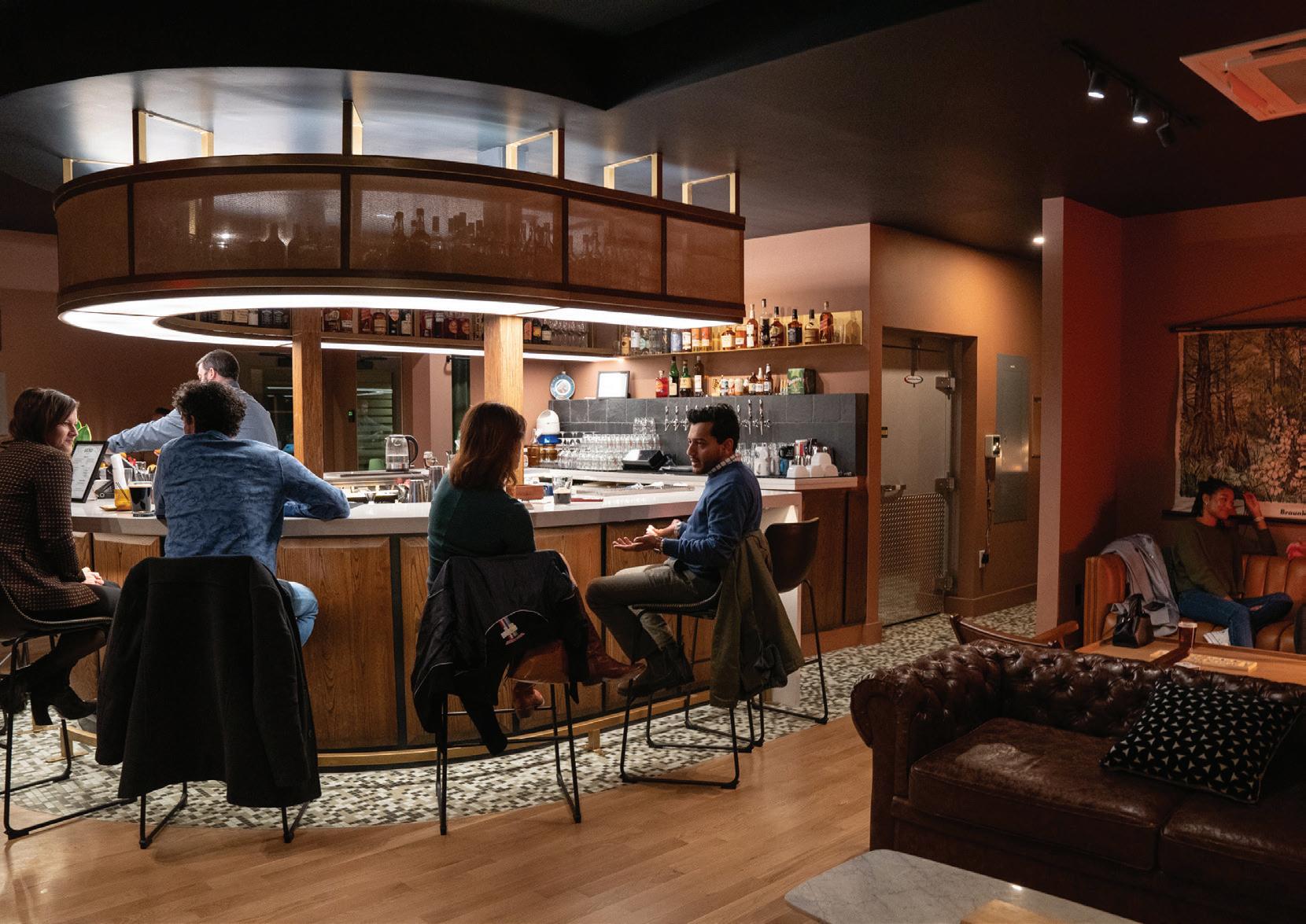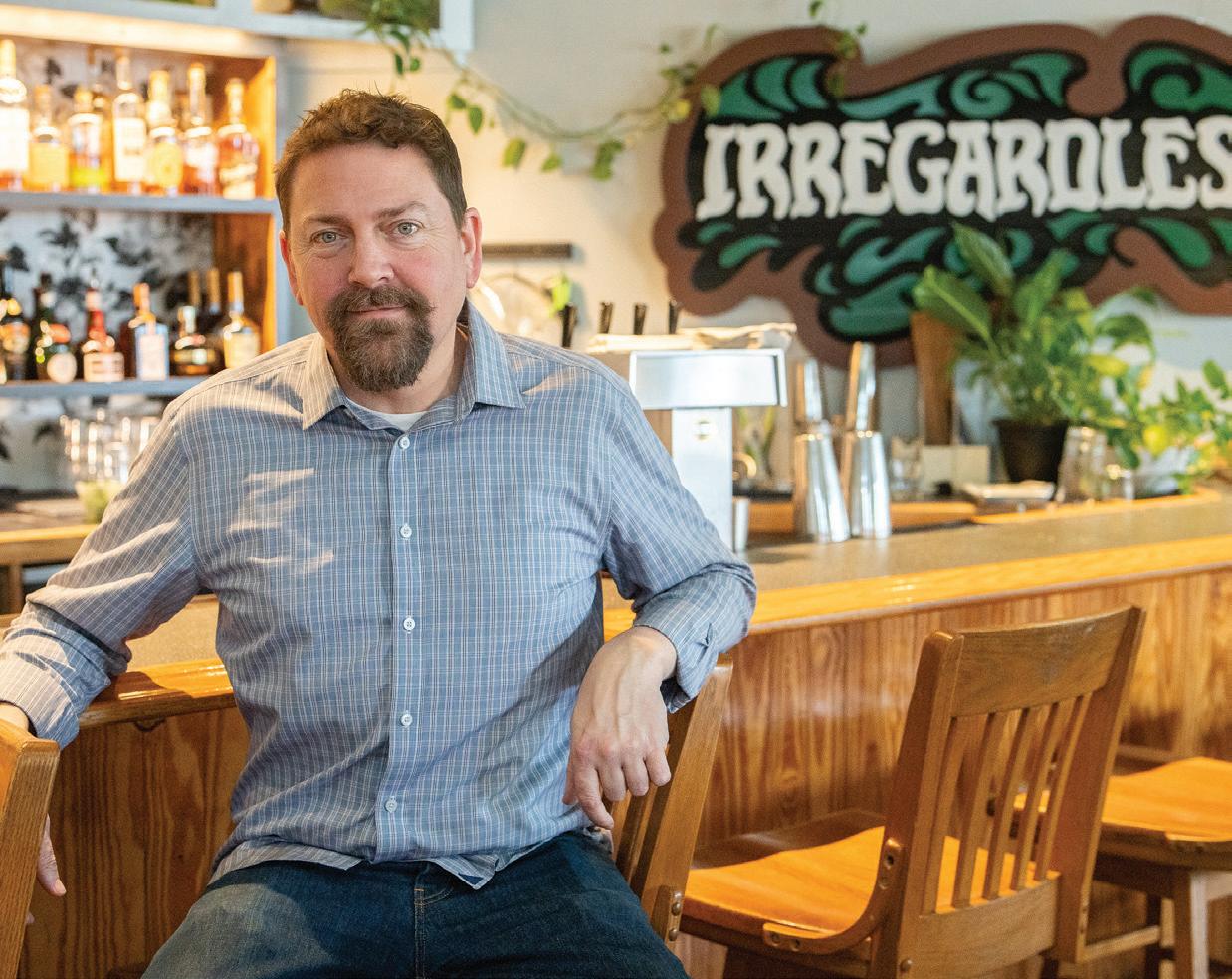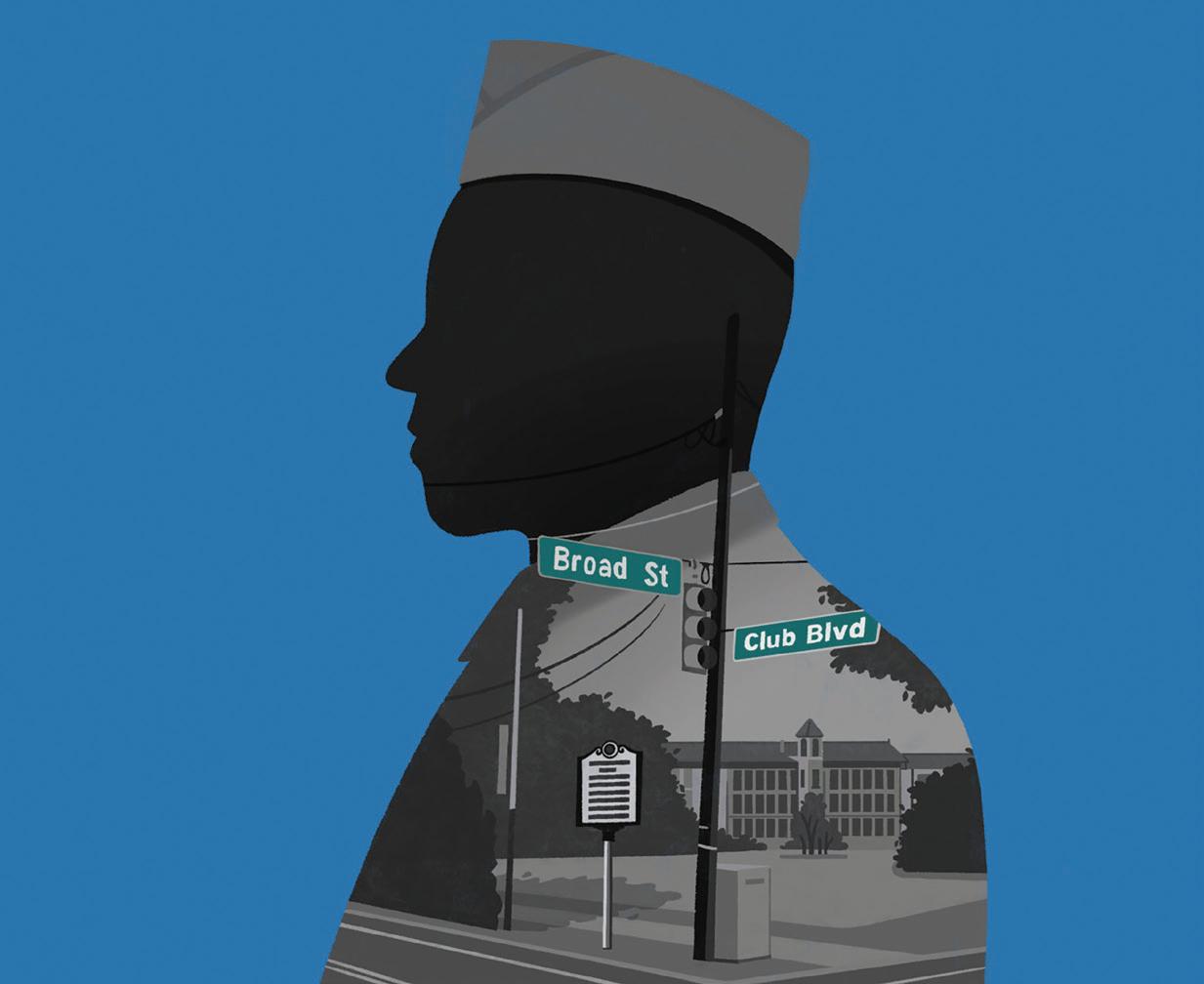












































































and Wake County grow? By Jane Porter, p. 13





5 Without Durham Public Schools bus service, some families are turning to bike trains to get students to school. BY CHASE PELLEGRINI DE PAUR
6 Is Durham Athletic Park making the most of its 5.42 acres of "rapidly developing" downtown land? The city is seeking resident input. BY JUSTIN LAIDLAW
7 Who is the Raleigh activist, millionaire, and "provocateur" behind a oneman protest at the state Supreme Court and AI ads of Mark Robinson? BY CHASE PELLEGRINI DE PAUR
9 Following three years of organizing, workers in Garner overwhelmingly voted against becoming the second unionized Amazon warehouse in the U.S. BY LENA GELLER AND ANGELICA EDWARDS
13 “If we’re being asked to suck up all this density,” says Yevonne Brannon, “don’t we deserve a library we can walk and bike and ride the bus to?” BY JANE PORTER
16 Checking in on Durham's vibrant jazz scene. BY GRACE YANNOTTA
18 The Bend Bar and a new State of Beer location are now open. BY NATION HAHN
20 Talking with Irregardless owner Lee Robinson as the restaurant celebrates 50 years. BY JANE PORTER
22 92-year-old Margaret Teta is Instagram's sweetest influencer. BY LENA GELLER
23 How to navigate Duke Gardens during construction season. BY LENA GELLER
24 A new publication puts young Latino artists at the center. BY CHASE PELLEGRINI DE PAUR
4 Backtalk
26 INDY Selects 27 Culture calendar
COVER Members of Friends of the Athens Drive Community Library. PHOTO BY ANGELICA EDWARDS
Publisher
John Hurld
Editorial
Editor-in-Chief
Sarah Willets
Raleigh
Editor
Jane Porter
Culture Editor
Sarah Edwards
Staff Writers
Lena Geller
Justin Laidlaw
Chase Pellegrini de Paur
Report For America Corps
Reporter
Chloe Courtney Bohl
Contributors
Mariana Fabian, Jasmine Gallup, Desmera Gatewood, Tasso Hartzog, Elliott Harrell, Brian Howe, Jordan Lawrence, Elim Lee, Glenn McDonald, Nick McGregor, Gabi
February 19, 2025 INDYweek.com

Mendick, Cy Neff, Andrea Richards, Barry Yeoman
Copy Editor Iza Wojciechowska
Creative
Creative Director
Nicole Pajor Moore
Graphic Designer Ann Salman
Staff Photographer Angelica Edwards
Advertising
Publisher John Hurld
Director of Revenue
Mathias Marchington
Director of Operations
Chelsey Koch
Account Representative Andrew Whiteley
Circulation Berry Media Group
Membership/ subscriptions John Hurld Mathias Marchington
Advertising sales sales@indyweek.com 919-666-7229
support@indyweek.com
To reach INDY staff directly: tips@indyweek.com
permission.


From reader WILLIAM BOWLING:
Half-way through Mayor Leonardo Williams’ tenure, and he wants to stick the Durham city and county residents with a half-billion, new downtown convention center that will be his legacy? Where is he going to put it? Downtown has been developed so much, there is no room. Not fair for the taxpayers in the suburbs to have to pay for a downtown center, we do not care to visit. Since COVID, our fancy, expensive, “Foo-Foo” restaurants continue to close. We should have put a K&W Cafeteria on the bottom floor of one of the new apartment complexes. How about providing needed police protection to small businesses? Example, ‘Ole N.C. B B-Q restaurant, at North Duke Mall. Small, minority owned “comfort food” place that has been robbed so many times that the owner no longer takes cash, only cards. Which means he is going to lose more customers. Let’s improve the safety of our residents.
From Bluesky user MARKYMARX69:
I’d rather get an actual gladiator coliseum.
Lena Geller caught wind that actor Patton Oswalt visited Rubies on Five Points on January 24 and
left as a big fan of the Durham music venue/bar. Readers enjoyed the piece:
From Bluesky user AMELIA:
It’s hard for this Tar Heel to admit there is anything cool happening in Durham (home to that other school) but this is a cool story and there are some very cool places in Durham. If you’re a fan of the Ratatouille movie and Remy, you’ll like this story, too.
From Bluesky user RY:
“Big high rises are not why you want to go to a city.” One of the coolest “celebrity in town” pieces I can remember in a while, from @lenarosegeller.bsky.social.
Finally, a guest op-ed from Durham Public Schools social worker Sonya Lopez about the need for more worker involvement in DPS decision-making has generated conversation among readers:
From reader BRUCE J. STOEN:
Sonya Lopez, thank you for your op-ed.
There is NO accountability, discipline, responsibility, or ownership taken for these problems....another major financial debacle. The school board, superintendent ($270,000 salary), assistant superintendents, finance director and individual school
leadership are all responsible for these devastating financial problems but no one is taking any responsibility. As long as they continue to receive their compensation, why change the status quo.
The general consensus is that, “oh well, the taxpayer will have to fix the problem.”
News flash...the taxpayers are beyond frustrated, they are angry and about to demand change or not pay their “out of control” property taxes.
It is not only time for a community, parents and staff based leadership committee to be formed with the power to make hard decisions and develop guidelines to prevent such catastrophes in the future but to terminate the entire leadership of Durham Public Schools to include the superintendent, financial leadership and resignations from the school board who can’t make common sense decisions. A voluntary leadership group with diverse backgrounds from successful business leadership, public sector, business development, finance experts, operations and maintenance and operational planning.
These finance issues could have been avoided had there been individuals responsible and accountable for planning and budgeting in every single
area of the system, every school, every building, and that group was monitored and they routinely met with the assistant superintendents and superintendent and presented findings to the school board in an open meeting, over the course of months, not days, in preparation for budget planning. Just like a successful business does and most of the private schools do, in the Triangle.
Imagine private sector companies managing their organizations with countless major financial shortfalls in their operational finances and structural issues, and major equipment issues and utility costs out of control. How long before that organization shuts its doors and/or terminates its leadership?!?!?
Guess now is the time to apply for the North Carolina Opportunity Scholarship Grants for your public education students and move to a school providing private education that HAS a proven track record of financial security, fair and equitable compensation, parental involvement REQUIRED, established planning and development policies and procedures and that require accountability, responsibility and ownership among the leadership, period.
A taxpayer…one of the frustrated and angry taxpayers.

Without Durham Public Schools bus service, some families are turning to bike trains to get students to school.
BY CHASE PELLEGRINI DE PAUR chase@indyweek.com
At 7:30 on a recent Wednesday morning on West Club Boulevard, Durham’s youngest cycling squad started their commute to E. K. Powe Elementary School.
With jackets zipped against the cold air, bike lights flashing, and neon visibility vests catching the sun’s early rays, the peloton of about 10 kids—flanked by parents—had clearly left their training wheels far behind as they zoomed down the side streets of Old West Durham.
The route, under a mile in length, took the cyclists about the same amount of time that it would have taken in a car. And, with the right preparation, it was perfectly safe for kids of every age.
The E. K. Powe bike train isn’t new. Parents and students have been gathering at this spot for about a year and a half.
But the group has taken on new significance as Durham Public Schools continues to lack sufficient bus transit for students, and parents seek new ways to get their children safely to school. Last month, the district implemented “family responsibility zones,” areas in which students do not receive district transportation, for 21 elementary schools, including Powe.
While biking isn’t an option for everyone—bikes can be expensive, and many Durham neighborhood roads are built for fast cars, not children on bikes—the Powe parent organizers hope that other residents are similarly inspired.
“Anyone can come, anyone can ride,” says Scotty Mathess, bike train co-organizer alongside David Bradway. “The kids really enjoy it. They talk, they banter, they race a little,
and it’s just another time when they can see their friends and just have a good time before school and get stoked for the day.”
INDY can independently verify that the kids seemed to enjoy all parts of the ride—before the bike train left, several budding scholar-cyclists were spotted taking turns dropping rocks on a frozen puddle. And once they’re old enough to bike without supervision, they’ll enjoy the freedom of having one’s own set of two wheels.
The Powe bike train has also greatly benefited from the support of Bike Durham, a nonprofit that advocates for safe and equitable access to biking, walking, and transit. While hustling to provide help to DPS families where needed, Bike Durham has seen an opportunity in the bus crisis to promote cycling. Jacopo Montobbio, the nonprofit’s education program manager, lives in the neighborhood. That morning, he dropped in to hand out bike lights and Bike Durham stickers to the students.
But Montobbio was worried about the safety of students across town at Hope Valley Elementary School, where there is no suitable crosswalk to traverse University Drive. The next day, on February 6, DPS announced it was restoring bus service in the family responsibility zone around Hope Valley Elementary, citing safety concerns.
“Our job at Bike Durham is to make sure that we hear from these local neighborhood organizations and make sure that these projects get to the city, either through DPS or through us,” says Montobbio.
Mathess hopes that this crisis leads to some lasting, positive change in the city.
“They’re probably going to fix the problem, get more bus drivers, and then forget about the whole thing,” he says. “But the next time there’s a crisis, perhaps the streets will be ready and the infrastructure will be in place to make it easier for the next generation of kids to be able to safely walk and bike to school.” W

The City of Durham is seeking resident input on how to make better use of the Durham Athletic Park, an ‘underutilized’ Bull City landmark.
BY JUSTIN LAIDLAW jlaidlaw@indyweek.com
The future of the Durham Athletic Park, one of Durham’s most famous historic landmarks, former home to the Durham Bulls, and iconic backdrop to Bull Durham is up in the air.
On 5.42 acres of “rapidly developing area,” the current use of this space as a baseball field is underutilized, according to the City of Durham, which wants to hear from residents about how this land can be used in the future to better serve Durham residents.
“Feedback from this effort will be used to develop a concept that will benefit the community, tie in with adjacent open spaces, and create a more accessible and vibrant use of the facility,” the city’s website notes. A survey, open through the end of the month, is an early step in the city’s equitable community engagement process.
Freshman councilor Carl Rist has his own history with baseball and the DAP. He played one season of collegiate
baseball at Davidson College, and picked the sport back up later in life when he joined a men’s league that played games at the old Bulls park.
Rist, like many Durham residents, sees the DAP as one of the city’s iconic brands alongside Duke University. Durham Athletic Park is a uniquely famous sports facility for a non-major professional sports team. The stadium played a prominent role in the 1988 movie Bull Durham.
The Durham Bulls played their last game at the DAP in 1994. The new Durham Bulls Athletic Park opened on Blackwell Street for its first game in April 1995.
“How do we wrestle with how to improve this prime space downtown that has lots of growth around it and make sure it’s more accessible to the public?” Rist says.
Importantly, the survey notes that the city is not interested in selling the land or using it for a private purpose, like condos. “Open space is lacking in the urban center
of Durham and this space shall remain accessible to the public,” the survey reads.
Construction in the area has surged in recent years. Apartments are being built across Washington, and the DIY district is in the midst of a dramatic makeover with the addition of Geerhouse and other new residential buildings.
Fullsteam Brewery, one of the anchor tenants of the neighborhood for over a decade, recently moved after wrestling with construction disruptions for years.
Durham Athletic Park isn’t the only downtown site in need of a facelift. City leadership is already looking at making big changes with the Durham Convention Center. A consultant expects a new center to cost north of a half-billion dollars.
The survey, open until February 28, can be found on the city’s website. W
Raleigh activist, millionaire, and PAC creator Todd Stiefel is shouting into the political void. Is anyone listening?
BY CHASE PELLEGRINI DE PAUR chase@indyweek.com
At 9:15 a.m. on a cold, rainy Tuesday, Todd Stiefel parades up Raleigh’s Fayetteville Street in a judge’s robe and powdered wig.
The 50-year-old millionaire, with an “I AM NOT ELECTION-GRIFTIN’ JUDGE GRIFFIN” sign around his neck, is staging a one-man protest against Republican candidate Jefferson Griffin’s attempt to throw out 60,000 votes in the North Carolina Supreme Court election.
“I’m actually a little surprised there’s no one else here,” Stiefel says, gesturing around the outside of the state supreme court building with a gavel. “I assumed other people would be protesting.”
Dressing up like a judge—and hiring a digital mobile billboard to cruise around the block with a photoshopped image of five Republican justices roasting marshmallows over burning boxes of ballots—is Stiefel’s most recent, but probably not most bizarre, political stunt.
In recent years, Stiefel has hired a plane to fly a banner over an antimasking protest and partnered with a comedy team to ambush state superintendent candidate Michele Morrow with printouts of her old tweets calling for Barack Obama to be executed. In the run-up to the 2024 election, then-gubernatorial candidate Mark Robinson called Stiefel “bound and determined to destroy me” after Stiefel set an AI-generated version of Robinson loose on the airwaves with a $1 million ad buy.
His full-time job of ridiculing North Carolina’s most ridiculous candidates is, so far, self-funded. Stiefel is the benefactor of his own political action committee (PAC), Americans for Prosparody.
His family owned Stiefel Laboratories, the world’s largest private manufacturer of dermatology products in the 2000s. With a Duke education and 14 years at the family company, he was groomed to take over, until the family decided to sell the company to pharma and biotech giant GSK in 2009.
“I went from knowing my career and having that longterm future planned [to], all of a sudden, unemployed,” he says.

Unlike most suddenly unemployed people, though, Stiefel was also rich. Not, like, Koch brothers rich, but rich enough that he wasn’t scrambling to send his résumé to recruiters. Following suggestions to find a cause he was passionate about, he dove into activism.
“I just went in full blast and immediately took it as a full-time job,” Stiefel says. “It was important to me to show my kids that work was important.”
For a decade, Stiefel has been especially focused on organizing and advocating for atheists. That work morphed into an education campaign against Christian nationalism, which found a perfect target in Robinson and his especially violent brand of political rhetoric.
Stiefel spent his 2024 election night celebrating Robinson’s defeat alongside Democratic bigwigs at the party’s Raleigh gathering. He donated at least $40,000 to Democratic candidates and PACs in 2024 alone and at least $18,000 to now-governor Josh Stein since 2016 (for one 2023 donation, Stiefel listed his occupation as “provocateur”). But his allegiance, he says, isn’t to a particular party.
Stiefel was raised on capitalism and Catholicism in Miami.
His grandfather Werner, inspired by the capitalist utopia described in Ayn Rand’s Atlas Shrugged, tried to start his own tax-free micronation on an artificial Caribbean island. He eventually gave up his “Operation Atlantis,” but a young Stiefel would still receive cash in the form of decas, issued from the Bank of Atlantis, for Christmases and birthdays.
Stiefel says his family wasn’t strongly religious, but like many he went to college and started questioning the logic behind the faith. A Republican for his early adult life, he was surprised by what he saw as an outright disrespect toward atheists and an overall lack of compassion.
“I left the Republican party over gay rights,” Stiefel says. After the January 6 riots he briefly registered as a Democrat when he saw how Republicans failed to rebuke Trump. “And then I left the [Democratic] Party because, oh my gosh, it was so crazy liberal, I couldn’t do it. And it was so damn dysfunctional.”
So in 2024, he started work on Americans for Prosparody, a play on the billionaire Koch brothers’ conservative Americans for Prosperity, hoping that comedy could cut through the traditional media din of an election.
“The vision is to essentially create a sustainable dark-money group that can use comedy to educate on American corruption, extremism, and authoritarianism,” he says. “I think, like a lot of Americans, I was feeling angry at how broken the system is. And powerless about how little I could do about it, even with money. And this was the only way I could figure out to really make a difference and to be happy and to laugh while doing it.”
Andrew Carnegie argued that wealth should be put to use to produce the greatest benefit for society. It’s not yet clear whether Americans for Prosparody is an effective tool for producing that benefit or if it’s just a pet project that no one close to Stiefel is willing to advise against. Robinson ultimately lost his election for governor by
15 points after CNN reported that he had posted about being a “Black NAZI,” among other things, on a porn website starting in 2008. With all that going on, it would be difficult to credit Stiefel with destroying Robinson, but Stiefel believes the PAC “might have” played a role in taking down Morrow, who only lost by about 2 percent. His approach relies on the idea—and Stiefel seems to believe it—that people are still persuadable. Perhaps that comes from his grandfather’s Randian influence. “When I disagree with a rational man,” writes Rand, “I let reality be the final arbiter: If I am right, he will learn; if I am wrong, I will; one of us will win, but both will profit.”
Chris Cooper, professor of political science at Western Carolina University and a man quoted in every high-quality story about North Carolina politics such as this one, isn’t so sure about the impact, yet. Is Stiefel just pissing his money into a political void?
“If the goal is to move the needle on a few targeted general assembly seats and the messages are tailored to that goal, then it’s as good a use of money as most other political expenditures,” Cooper says in an email. “If the goal is to discredit the image of the Republican Party in general, then it’s pissing money away. And, I might add, pissing it into a void the size of the Pacific Ocean.”
John Galt, the Übermensch of Atlas Shrugged, reshapes the world through sheer force of will and conviction of purpose. Stiefel isn’t convinced he can bring about a political sea change with a few million dollars (last year nearly $16 billion was spent on federal elections).
“I can’t change the arc of history,” he says. “Maybe if I were a billionaire. I have only the ability to nudge the needle a little bit.”
Voters are seeing his work, whether it sways them or not. The video of Morrow got nearly 9 million views on Twitter. On Facebook, ads featuring an AI-generated Robinson voice garnered thousands of likes and shares—though many comments praised Robinson.
“Love this man, GOD BE WITH HIM,” commented one Cheryl Sawyer on an ad featuring Robinson holding a severed head. “He has my vote!” agreed dozens of other commenters.
Zack Czajkowski, a Durham-based Democratic operative, is the political consultant for Stiefel’s fledgling PAC and his number two on the project. He says the campaign doesn’t need to reach all 11 million North Carolinians to be effective.
“If we can get 10,000 people in North Carolina to say ‘that’s funny’ and think a little bit harder, and then 10 percent of
those—you move 1,000 votes,” Czajkowski says. “Do you know how valuable moving 1,000 votes is in an election that could be decided by 10,000?”
Czajkowski, who worked on the Obama and Hillary Clinton campaigns, says he initially hesitated to publicly affiliate himself with something as out of the box as Americans for Prosparody. And while he doesn’t like calling it “weird,” that’s ultimately why he’s sticking with it.
“It might not work. I hope it goes swimmingly and that we completely change the playbook. But if it doesn’t work, we tried,” he says, adding that billions are already being spent “on the traditional playbook.”
Stiefel’s rogues’ gallery is as eclectic as his work. Robinson and Morrow headline a list that includes former Stiefel Laboratories employees as well as major nonprofits. In 2020, Stiefel Laboratories and Charles Stiefel, Todd’s father, paid a $37 million settlement to shareholders who claimed the company “failed to disclose negotiations … that ultimately resulted in [GSK] purchasing Stiefel Laboratories for a share price more than four times higher than the share price the company paid to employee shareholders,” per the Securities and Exchange Commission. Todd Stiefel, who wasn’t named in the suit, says his father ran the company with “absolute integrity.”
Stiefel’s atheism has been a point of contention with several nonprofits hesitant to accept his sizable donations (“I cannot begin to tell you how demoralizing it is,” he says).
As an example, in 2010, Stiefel donated $20,000 to the ACLU of Mississippi to help sponsor a prom after a lesbian couple was barred from attending theirs. The organization rejected the gift, concerned about the perception of Mississippians who “tremble in terror at the word ‘atheist.’” The national ACLU eventually stepped in, and with Stiefel’s donation and support from celebrities rallied by the controversy, the event went forward.
“I went to the prom, and Questlove performed,” says Stiefel. “It was cool.”
Stein’s campaign team was careful to keep Stiefel at arm’s length, too. When the first anti-Robinson ads came out, Stein told WRAL that “any use of AI to mislead voters is unequivocally wrong and has no place in this campaign.”
Czajkowski called the Stein reaction a “bummer” but added that he understood why the campaign was cautious about associating with ads that depicted Rob-
inson yelling at Martin Luther King Jr. and boasting about paying for an abortion wearing a devil onesie.
Czajkowski is unlikely to say something bad about his boss. But he seems to genuinely admire Stiefel’s dedication.
“Most [rich people] just buy another car, buy another house, start a charitable trust just for write-offs,” he says. “Here’s a guy who gives a shit. Maybe you agree with him, maybe you like what he’s doing, maybe you don’t. But you just can’t argue with the fact that the guy cares, that he’s trying.”
Why doesn’t Stiefel just write some checks and spend his days at the beach rather than running around rainy Raleigh in an itchy wig?
Maybe that, too, could be answered by Rand, who wrote, “Your work … That’s the meaning of life.”
Stiefel says that the often-complicated experience of working with nonprofits pushed him to try projects that he has more control over. He also admits “a high bias” for his own ideas, like the “wild experiment” of launching his own comedy PAC.
Cooper says Americans for Prosparody is “more a twist on what already exists than a new approach to campaigning,” citing Stephen Colbert’s Americans for a Better Tomorrow, Tomorrow PAC and FireMadison, a PAC created to troll and destroy former NC congressman Madison Cawthorn.
“In a way, it’s very common,” says Cooper. “As [Americans for Prosparody] points out, wealthy people creating and running super PACs to influence election outcomes is common in America—so common that the best way Stiefel has to combat wealthy people creating super PACs is to mock wealthy people using super PACs by … well … using his considerable wealth to
create a super PAC.”
If the PAC is an experiment, it’s too soon to determine its success. Stiefel and Czajkowski hinted at a larger launch for their next project, EvilPAC, in the spring. The satire campaign already has a website with teasers like “Do you have Fuck You Money? Are you growing bored of spending it trying to mate a horse and a yak to give birth to your own unicorn just for shits and giggles? Why not put that money to use exploiting a corrupt political system?”
Maybe he’s shouting into a void. But there are some signs that Stiefel is making enough noise to be heard.
During his one-man protest in Raleigh last week, Stiefel ducks inside a coffee shop to warm up. The barista behind the counter eyes his sign.
“That’s the dude who’s trying to steal the seat? That fucker,” says the barista. “It’s hard to keep up with everything that’s going on right now.”
Stiefel agrees.
Over a cup of coffee, he says Americans for Prosparody has proven it can find an audience, and his short-term goal is to make it financially viable so he’s not just pouring money into it.
And as he leaves the shop, a pair of coffee drinkers flag him down.
“Are you trying to be a real judge or something?” the innocent bystander asks, unaware he is falling into the trap of the stunt.
“I mean, apparently nowadays, you can become a judge even if you don’t win the election, you just have to have enough votes thrown out,” says Stiefel. “I’m doing a protest of Judge Jefferson Griffin, are you guys familiar with that case?”
They weren’t—yet. W

Amazon workers rallied before the union election votes were tallied Saturday, and reacted to the news that the effort was unsuccessful.
WORDS BY LENA GELLER, PHOTOS BY ANGELICA EDWARDS lgeller@indyweek.com, photographer@indyweek.com
Workers at Amazon’s RDU1 warehouse in Garner have decisively voted against unionizing, with 2,447 voting against and 829 in favor of joining the Carolina Amazonians United for Solidarity and Empowerment (C.A.U.S.E.).
Approximately 4,300 workers at the two-million-square-foot facility were eligible to vote.
The defeat comes after three years of organizing efforts at RDU1, where workers sought $30 hourly wages, paid sick leave, and better working conditions. The election followed an intense anti-union campaign, with Amazon holding daily town halls that workers described as “vote no” rallies.
C.A.U.S.E. president Ryan Brown, who was fired in December over disputed harassment allegations, urged workers to keep fighting.
“There are lessons to be learned in losses that you can’t learn in victory,” Brown said outside the warehouse following Saturday’s result.
The vote adds to a string of unsuccessful attempts to unionize Amazon warehouses in the United States since workers at JFK8 in Staten Island made history as the first to unionize in 2022.
INDY photojournalist Angelica Edwards captured scenes as workers rallied before the election and reacted to the vote.


– Lena Geller INDY Staff Writer











Replacing the Athens Drive Community Library in West Raleigh has become the latest flash point in an ongoing debate of the last decade: How will the city and Wake County grow?
BY JANE PORTER jporter@indyweek.com
Yevonne Brannon remembers taking her toddler daughter to the grand opening of Athens Drive Community Library, housed inside Athens Drive Magnet High School, in 1978. This was before the trails at Lake Johnson Park were built out, long before the opening of the Thomas G. Crowder Woodland Center.
Brannon’s grandson just graduated from Athens Drive High, marking a full-circle moment for the family—the kind of moment that families living in Athens Woods, Bryn Mawr, and all around Lake Johnson want to continue enjoying for decades to come.
“I’m just one of many who’ve lived in the neighborhood forever and have worked really hard to keep the amenities,” says the West Raleigh resident, longtime community activist, and former Wake County commissioner.
Whether they can, residents say, hinges on whether a new version of the library, slated to open sometime in the next seven years, will remain in the community. Due to long-running safety concerns and a renovation of the high school planned next year, a replacement for Athens Drive Community Library was part of the county’s $142 million libraries bond package that voters


approved in November.
But residents—already distressed over three prior attempts to close the library, its starkly reduced hours, and limited resources compared to other Wake libraries—are worried about the county’s commitment to keeping their treasured library close by. Public records show county staff have already considered a site in Cary, nearly three miles away.
“We want it to be a safe place for our kids, something they can walk to,” says Hannah Mckenzie, who lives on Athens Drive and is a member of the Friends of Athens Drive Community Library advocacy group that Brannon chairs. “We want the folks in the community who don’t have access to personal vehicles to be able to access the library.”
The communities surrounding Athens Drive Community Library are some of the densest and fastest-growing in Raleigh. They’re close to NC State University’s campus, the State Farmers Market, and the Beltline, though the next closest libraries—Oberlin Regional and Cary Regional—are four and six miles away, respectively. The neighborhoods around Athens Drive are also some of the city’s most culturally diverse and economically mixed communities. Patrons walk, bike, push strollers, and pull wagons to the library regularly. It’s located along a GoRaleigh bus line.
“That’s what makes this library unique—we’re hitting big swathes of this really diverse population,” Mckenzie says. “That’s what we would like to see again, and we’re not seeing it now with the library only being open halftime. If they put the library here, we’ll be able to see that vibrancy again.”
At an evening community meeting at the end of January, dozens of residents crowd into a reading corner at the library to discuss with county staff plans for its replacement. The Friends of Athens Drive Community Library give a presentation and community members chime in with their stories.
A young mom, newly relocated to Raleigh from Michigan, tells the group she walked over to the library with her daughter for story time, met new neighbors, and made friends. A mother with an adult son with special needs says the pair visits the library frequently. Once, her car broke down in the library’s parking lot, a situation that normally would cause her son stress. Instead, she says, they were able to walk home because they live so close by.
The library opened in Athens Drive High School in the 1970s thanks largely to the efforts of Raleigh City Council member Miriam Block.
“She was what you’d call a fiscal conservative,” says Brannon. “She made big arguments that we shouldn’t be building all these different school buildings and county facilities and that taxpayers should be sharing resources. So she made a good case for ‘We need a library, we’re building the school—we should put the library in the school.’”
That unorthodox cohabitating arrangement hasn’t always been easy for the high school and the community library. Security concerns about having members of the public inside the high school have meant that county officials glanced in the library’s direction periodically
14 February 19, 2025 INDYweek.com

when they wanted to pare down the budget. The community has successfully rallied to save the library from closing three times in the last 15 years, in 2009, 2015, and 2021. That last time, in 2021, the library’s service hours were reduced to 35 hours a week. Other libraries in the county’s system are open for 61 hours.
“Every time we get a new principal [at the high school], the rules change, the principal’s comfort level with the public in the building changes,” says Mckenzie.
During a community meeting in June 2022, residents thought they had come to an agreement with county staff that the library would be rebuilt as a freestanding building on the high school’s campus. The high school had plans to renovate soon, anyway, and last year, replacement of the Athens Drive Community Library was part of the successful countywide library bond. It was one of two “replacement library” projects requiring construction of a new facility (Rolesville is the other), and one of five new libraries planned for with a dedicated sum of $67.1 million.
The residents make a good case for keeping the library in their community. Data the Friends group compiled shows that 11,500 people live within a 30-minute walking radius of the library at its current location. The median household income for those residents is $65,400, and 45.7 percent of the residents are nonwhite. In the census tracts that overlap with the 30-minute walk shed, 6.3 percent of households are carless and 48.7 percent of households own one vehicle.
Digging in even more, the EPA rates the census tracts around the library as highly walkable, with a high population of residents who have access to public transit.
And there is nearby land available, the library advocates point out. There’s the massive Athens Drive campus, of
which a replacement library could take up a small portion, sharing parking with the school. There’s also a forested parcel at 4200 Avent Ferry Road that the City of Raleigh owns, as well as several city-owned lots at the end of Jaguar Park Drive. And, residents say, they’ve suggested several potential sites to county staff: privately owned lots along Avent Ferry Road, Athens Drive, Kaplan Drive, and Gorman Street, all plots near the high school that are currently underutilized and that have owners who may be interested in selling.
A community library doesn’t need a ton of space, the residents argue. The median footprint of Wake County’s 23 libraries is 2.63 acres, and most of the community libraries (and one regional library—Cary’s) sit on less than three.
“If we’re being asked to suck up all this density,” says Brannon, “don’t we deserve a library we can walk and bike and ride the bus to?”
Wake County’s official line is that it is in the beginning stages of the land acquisition process and working with its real estate team to start looking at properties. The county’s Facilities Design and Construction Department will submit a request for qualifications for design firms to get involved with all of the library bond projects once land parcels are identified. The projected size for the replacement library is 12,000 square feet; the county wants four to five acres for parking and other amenities, though county officials say they would be open to smaller acreage depending on
Story continued on page 17



In Durham, North Carolina Central University’s legendary jazz program continues to usher music into every nook and cranny of the city.
BY GRACE YANNOTTA music@indyweek.com
On a recent frigid Saturday night, snow still sticking to the ground, I approach Sharp 9 Gallery. A velvet curtain swings open to reveal an intimate space—rows of candlelit tables and chairs, a petite bar in the back—that serves as a love letter to New York City’s Village Vanguard.
For the past decade-plus, Sharp 9, founded in 2012, has been a locus of the Durham jazz scene. It’s a robust scene, one bolstered by NC Central University’s jazz program and the greats that have come out of it, but one that can often fly under the radar—especially to people who are new to the city or younger residents, like me, who don’t know where to start.
At Sharp 9, I sip a generous glass of Pinot Grigio and munch on chips as the room fills with a gregarious crowd that has the camaraderie of a high school homecoming game. Up first: a performance by the Joseph Foglia Quin-
tet. Foglia, an Enloe High School graduate now working in New York, leads the band with Triangle native Luca Colonna on piano and Killian Winn on bass. Local powerhouses Al Strong on trumpet and Devin Fuller on drums complete the group.
The lively two-set performance mixes Foglia’s compositions with jazz standards.
“Al got all the music the day before,” Foglia tells me. “I went over to [Devin]’s house and we practiced a little bit …. We were supposed to have a rehearsal but because of the snow, we didn’t. It was our first time playing all of it.”
That surprises me, not just because of the quality of the music but because of the musicians’ familiarity—onstage, they literally stepped back from the spotlight to cheer one another on. Foglia returns to the Triangle for this kind of collaboration, he says.
“It’s healing for me to come back here and play because of all that positivity that exists within the music,” he says. Fittingly, the finale is “Where I Come From,” a piece Foglia composed for Raleigh.
The following week, on Tuesday, I’m at Kingfisher for an evening of live music, grateful for a reserved table as the bar grows cramped. The Jeremy “Bean” Clemons Trio kicks things off with free jazz that fills the low-ceilinged lounge. It is an incredible wall of sound. Clemons, on drums, leads Tinashe Blu on saxophone and Kevin Beardsley on bass. Clemons’s residency at Kingfisher began in 2019 shortly after the downtown bar opened. The gig was initially pioneered by the late NCCU professor and jazz great Brian Horton, who died in 2023.
“When [Horton] transitioned I spoke with the owners and I told them I would like to keep this residency going in honor of something that he started,” Clemons shares. Despite leading the weekly jam session for years, Clemons hesitates to call himself a jazz musician.
“I’ve said ‘jazz’ more times in this interview than I’ve said in the last 10 years,” he says. “Because I don’t really say jazz. It’s music. I say ‘straight-ahead’ more than anything.”
“Straight-ahead,” Clemons explains, is his mind-set that encourages improvisation and blends genres: his first gigs were with a blues band, he’s toured with an electronic DJ, and he’s currently the drummer for the reggae band Burning Spear and jazz-soul-groove band Soul Understated, a collaboration with Mavis “Swan” Poole.
His leadership guides the trio into a tantalizing sound that draws young musicians, including Foglia, who have brought their instruments tonight, eager to join the jam session that Clemons calls fellowship.
“It’s not about me or about the trio playing all night,” Clemons says. “Come to play. Come to learn from each other. That’s really what it’s about.”
My final Bull City jazz stop was intended to be the Eagle’s Nest Jam at Missy Lane’s Assembly Room, an NCCU-led event. But with the semester just beginning, the event was canceled as students were still preparing. I reached out to Thomas Taylor, the organizer of the almost-year-old event, and was treated to a sneak peek: Central’s Jazz Combo rehearsal.
Taylor’s reputation as a rousing educator precedes him (Clemons describes Taylor as having “really made me grow as who I was”), but it was another thing entirely to be
there. In a rare sequence for North Carolina, it had snowed again and Central had just reopened from suspended operations three hours earlier. The basement of Edwards Music Hall, though, was energized.
It’s their first rehearsal of the semester, and the students work on Michael Mayo’s cover of Miles Davis’s “Four.” Taylor intentionally chooses modern arrangements of jazz standards like this to engage students.
“Do you like it?” he asks the room after playing the track. The students respond with a resounding yes.
”It’s something new that they get really attracted to,” he says about the song choice. “And it helps them understand the history, right?”
An award-winning performer, Taylor has played and taught worldwide. In his own words, though, he’s humble—“[I’m] just a guy from Elizabeth City. I try to play drums as good as I can. I try to help others play good music.”
Missy Lane’s, an elegant, Georgian-style building on Main Street, opened just over a year ago with the mission statement “To expand the audience for jazz and improvised music.” So far, it’s lived up to that goal. Each week is packed with events from concerts and wine tastings to films with live instrumentalists, all with jazz front and center.
The Eagle’s Nest Jam, held every Thursday at Missy Lane’s, is more than a social event for college-age performers—it’s a community-building engagement between students, alumni, and supporters. It’s fitting for NCCU, which Taylor calls “the nucleus” of Durham’s jazz scene. This bears out, even just in the piece: Horton founded the Kingfisher residency, Fuller from Foglia’s Quintet is a Central grad, as is Clemons, and Strong is on faculty.
“Our jazz combo is the reigning, twotime winner of the Monterey Jazz Festival HBCU Challenge, and Monterey is the oldest, longest-running jazz festival in the world. As well as our jazz ensemble, [they’re] the reigning national champion of this collegiate competition called the Jack Rudin,” Taylor notes, adding that NCCU is the only historically black college to be invited.
After all, these were just a sample of the jazz events regularly happening in Durham, not to mention the Triangle itself. And jazz, as Taylor puts it, is a genre that invites discovery—beckoning you down staircases and into classrooms, seeking out new notes, histories, and figures.
“The thing I’ve learned over the years when it comes to jazz,” Taylor emphasizes, “[is] if people really want to know, they’ll find out.” W
Continued from page 14
partnerships and the shape and topography of the proposed site. And the county lays out a preferred search area for a new site for the library that fans a 2.5-mile radius around Athens Drive High School.
“That’s the preferred area for the county for the library as well [as the community’s],” says Tammy Baggett, director of Wake County Public Libraries since June.
But there are two more tiers of search area radiating out from the preferred area, and the county’s goal with all of its library bond projects is to increase the number of Wake residents with access to a library within a 10-minute drive from their home. That could put the Athens Drive replacement library outside of Raleigh city limits.
It’s also not clear whether the Athens Drive High School campus is still under consideration as a site for the replacement.
“It was decided we were not going to look at putting the library on the WCPSS property,” wrote Elizabeth Sharpe, senior director of facilities design and construction for Wake County Public Schools, in an October 2023 email to Mark Roe, the county’s former senior facilities project manager who has since retired. “The property is very tight and having a public library on a school site poses security concerns.”
Sharpe added that the CORE team, a joint team comprised of staff from WCPSS and Wake County tasked with guiding long-range planning decisions for the Capital Improvement Plan, “made the call to find another location for the public library.”
Other records show county staff has already considered a site as far away as Cary.
In January 2024, Frank Cope, Wake County’s community services director, sent a screenshot of “a possible site for the Athens Drive replacement library” on “property owned by WCPSS at the corner of Tryon and Yates Mill Pond Road” to deputy county manager Ashley Jacobs.
“It is 7 minutes (3 miles) from the existing location,” Cope wrote. “We will also be looking for other locations, but this is certainly a viable location.”
“We want to build a library that will serve the community’s needs.”
Other locations could potentially include city-owned property, including a city-owned lot located behind the high school, and the City of Raleigh has made it clear that it’s a willing partner in helping to keep the library in the community. In a February 4 letter to the board of commissioners and county manager, District D city council member Jane Harrison advocated for a city-county partnership on the replacement library.
“We’re thrilled for the opportunity to build a new Athens Drive Community Library,” Harrison wrote, noting the area’s

rapid growth, racial and economic diversity, pedestrian and bus access, and 15-minute frequent service.
“We ask for your commitment that it stays in the current neighborhood,” Harrison continued. “We expect further population density in this area due to the City’s missing middle housing policies. We emphasize the need for the Athens Drive Library to remain in Raleigh and be accessible to our residents.”
Harrison said Raleigh’s city manager has also worked to identify opportunities for city-owned properties for the replacement of the library. All six other council members and the mayor signed the letter.
The county does look to be exploring a partnership with the city.
“Perhaps the next best step is for you and I to discuss what we are looking for to see if any of the property owned by Raleigh is an option,” wrote Cope, the community service director, in an email to Ralph Recchie, Raleigh’s real estate manager, on June 3. Jacobs, the deputy county manager, told the INDY that the county is evaluating “every potential property for the project” and that county staff are “very receptive to hearing ideas and suggestions from the community.”
“We want to build a library that will serve the community’s needs,” she wrote in an email.
Still, residents say they aren’t clear who at the county is moving the replacement library project forward and whether the different governing bodies—particularly the county and the school system—are having productive discussions with one another.
Baggett says she thinks partnerships are definitely on the table, though she says she has not been “personally involved in any of those conversations.”
But she wants the community to know that county officials are listening; ultimately they will make a recommendation on the location to the county’s board of commissioners, who will vote on whether to approve the site.
“No decisions have been made and we are really trying to understand the need, the interest,” she says. “We appreciate them advocating for their library and taking all those things into consideration when planning really does get underway for these next steps.”
The library’s advocates are frustrated but insistent; this isn’t new territory for them.
“The criteria [for what’s needed for the replacement library] keep changing,” says Brannon. “So we keep fighting to save our library. This is a great example of the conflict of density and growth and amenities, but when there’s a will, there’s a way.” W
Sitting side by side, an easygoing bar and bottle shop from Trophy Brewing mark a new neighborhood chapter.
BY NATION HAHN food@indyweek.com
Calling a bar a great bar is highly subjective. For some, that bar is a dark hideaway from the troubles of the day. For others, it’s a place where the dance floor stays packed until closing time. A great bar might depend on its location, its menu, and the prowess of its bartenders. But I’d argue that greatness also isn’t just about the bar itself— what elevates a bar is shaped by where you are in life and what you’re looking for at that moment.
I’ve had several chances to visit the recently opened The Bend Bar and the new State of Beer location from Trophy Brewing, both on Morgan Street near the flagship Trophy Brewing. Sitting side by side, the spaces offer cozy interiors paired with fire pits, picnic tables, and plenty of outdoor seating, making them feel right at home in their neighborhood.
Bend Bar opened quietly in December; this State of Beer location opened in late January. The dual spaces work for just about any mood—a lazy afternoon cocktail or beer outside on a warm Saturday, a casual dinner by one of the fir pits, or a quick bite to go after meeting friends for happy hour. Whether you’re settling in for a board game before heading home or stopping in for a prenight-out cocktail (if you have more energy than I seem to these days), these spaces fit the moment effortlessly.
I was excited when news of these new locations broke, but it came on the heels of something bittersweet: the announcement that Young Hearts Distilling would be moving out of the space that was once home to Busy Bee, a truly great bar that defined my first 10 years in Raleigh. Busy Bee and its upstairs hangout, the Hive, opened in 2009, just months after I moved to Raleigh and started working downtown. It’s hard to remember a great night from that time that didn’t include its infamous tater tots, a Miller High Life, or a Queen Bee—a delightful mix of gin, St. Germain, and pineapple.
My wife and I had just married, and with a relatively meager social life, we built much of it at that bar. In the years that followed, we celebrated both highs and lows there. When she died in 2013, it was the first bar I visited with

friends who were trying to help me find my footing again. And in the years after, as I pieced together what life looked like on my own, it was one of my main hangouts—a place that held both memories and new beginnings. Eventually, I drifted away from nights spent at the Hive as new spaces opened across town.
The team behind Busy Bee would eventually have another success story on their hands with Trophy Brewing—a single location that would become an empire of sorts. Over time, they expanded their portfolio to include everything from the original Trophy on Morgan Street to Trophy on Maywood, a taproom, production facility, events space, and Young Hearts Distilling, which would ultimately become the final tenant in the original Busy Bee space.
I sat down with Chris Powers recently to discuss this transition. Powers is one of the original founders of Busy Bee and Trophy alongside David Lockwood, David Meeker, and Les Stewart.
When they announced in December 2024 that Young Hearts would be moving its production and their lease on the building was coming to an end, my mind immediately went back to all the late nights spent in that space.
The lighthearted early years, the nights spent in mourning, the early steps back into dating and finding love again, and the realization that I could have fun without it being a betrayal. The memories came rushing back in the way only a place that truly mattered could unlock.
The good news for Raleigh is that the Trophy team has knocked it out of the park once again with these new
locations. They mark a new chapter for the city—and, in some ways, reflect the transition that many of us who moved to Raleigh between 2006 and 2010 have gone through ourselves.
While chatting, I ask Powers whether he sees Bend Bar and State of Beer as part of a new era for Raleigh—just as they are for the company and for him. After all, he and his wife met at Busy Bee. Today, they have three kids and a growing set of businesses.
“You know, at this stage in our lives, we’re more likely to go out somewhere close to home,” Powers says. “There’s definitely a renewed energy in neighborhoods across town, because when you’re a neighborhood hub, people want easy parking, they want bike parking—and you end up with a lot of people just walking over from their houses.”
Powers notes that many of the entrepreneurs who came of age in Raleigh are now in their late 30s and 40s, balancing careers and families—just as he is. And like anyone navigating this stage of life, nights out might look a little different. Instead of closing down the Hive’s dance floor at two a.m., this group is more likely to grab a quick beer after work or enjoy a few cocktails and a snack on a Saturday afternoon before heading home. For Powers and his team, the vision is clear: Bend Bar and the just-opened State of Beer are meant to be gathering spaces.
The Trophy team put a lot of thought and energy into designing Bend Bar. During our conversation, Powers points out various design elements, including what he jokingly referred to as “the fast lane”—a setup that allows guests to order a drink as soon as they walk in, before deciding where to settle in for the evening. Whether it’s a cozy seat by the window, a table under the heaters on the porch, or a picnic table out back on a nice night, the space is built to be easy, welcoming, and functional.
“I think you’ll see people coming in after work, people who work from home grabbing that first drink of the day, or friends catching up over a drink in the evening,” Powers says. “The idea is to create that third place—you know, not work, not home, but a place where somebody can go after work and be comfortable, or, you know, not feel like they have to get dressed up to go out here. Equally, we want it to be a place where they can come in dressed up before a night on the town.”
And if you want a great sandwich and an interesting beer, the second State of Beer is now open next door in a similarly charming bungalow.
The State of Beer space features a seven-seat bar, a handful of tables inside, and patio heaters outside, making it a year-round destination. A shared backyard between the two locations, complete with fire pits, invites you to linger over another beer (or two). The two spots share an ABC permit, meaning you can move seamlessly between them—sipping a cocktail from Bend Bar while ordering State of Beer’s new mozzarella sticks.
This second State of Beer feels like a natural evolution of the original, keeping its core identity intact while introducing a full
kitchen and thoughtful menu expansions. Thanks to the addition of a fryer—a first for State of Beer—the menu now features harissa dry-rubbed wings and crispy fries alongside the classics. The chicken cutlet sandwich comes in two styles: a classic chicken Parm or a version topped with cherry pepper relish, provolone, and greens. There’s also hot pimento cheese on sourdough and even housemade chocolate chip cookies for a sweet finish.
But don’t worry—longtime State of Beer favorites like the Jive Turkey, Alabama Slammer, and pasta salad aren’t going anywhere.
For longtime fans, this second State of Beer offers more of what made the original great: good food, good beer, and a setting that invites you to stay a little longer.
“I hope people are coming in here and they’re talking about the hospitality,” Powers comments when asked about the hopes for these new projects. “I hope they’re talking about the quality of the drink that they had and the way that the bar makes them feel. Our goal is to constantly tweak things to make sure that we’re representing hospitality and all of the forms that it takes. We want these spaces to feel welcoming— no matter where someone is in life, their day, or their weekend.”
And what’s next for the Trophy team? They have another massive Trophy project in the works as well. It will also reside in the heart of a neighborhood as it takes its place next to Ajja on Bickett Boulevard. Time and growth don’t slow down for any of us.
The secret I’ve found is to embrace where you are and try to relish the moment. Our favorites will inevitably close or change, but the ingredients that make a great bar or restaurant will allow for something new that meets us where we are. W


901 West Morgan Street | irregardless.com
On the 50th anniversary of Irregardless’s opening, we spoke with restaurant owner Lee Robinson about upcoming celebrations, a changing dining scene postpandemic, and keeping Raleigh Raleigh.
BY JANE PORTER jporter@indyweek.com
Irregardless owner Lee Robinson knows restaurants. And he knows Raleigh.
Before buying the iconic Morgan Street eatery known for its vegetarian and vegan dishes in January 2020—mere months before the COVID-19 lockdown—Robinson was a fixture of the local hospitality scene. He waited tables and cooked his way through college at NC State University and later ran such staples as the now-shuttered Frazier’s on Hillsborough Street, the Pit in the Warehouse District, and the Player’s Retreat, long loved by locals and State students alike.
After spending some time during the pandemic rethinking everything from Irregardless’s layout to its reputation—an amalgamation of fine dining meets farmto-table meets neighborhood haunt— Robinson is gearing up to celebrate the restaurant’s 50th anniversary. A party next week will play host to such luminaries as Irregardless founder and longtime owner Arthur Gordon and his wife Anya, who opened the restaurant in 1975; Governor Josh Stein, and a whole crew of regulars and current and former employees. Irregardless will also offer a dinner series throughout the year, celebrating famous dishes throughout the decades it’s been open.
The INDY caught up with Robinson at the tail end of a lunch shift to discuss post-pandemic dining patterns, cannabis drinks, running an iconic restaurant in the modern era, and a city that seems to be constantly changing.
INDY: Back when you bought Irregardless, you said you didn’t want to make a lot of changes and wanted to keep it how it always has been. How have you been able to do that, and why did you want to buy an iconic Raleigh restaurant?
LEE ROBINSON: My original idea, especially after having worked with [Greg] Hatem for so long downtown … he’s this preservationist. I really caught that vibe working for him. I actually have a list of old places in Raleigh that had the generation ahead of me as an owner. I know how to run a restaurant, but I didn’t necessarily need it to be my own creative thing, with, like, this new concept. So I thought I would put this preservational spirit into the community.

Player’s Retreat was top of the list, but [Irregardless] was on my list as well, to help keep Raleigh Raleigh. These places are going away. So what I wanted to do was find a place and figure out if we could negotiate a long lease to prevent a building from getting torn down. It will keep its soul for a little while. I found a good partner in David Meeker for that. He and I put this deal together where he bought the building and I got the business. And we have a nice long lease, so we can do this for 20 years.
How do you think about the changes this part of town has been experiencing? With the Goodnights building next door being gone, it feels like the city looks more different every day.
here, and everything beyond the [Morgan Street] traffic circle is coming up, too—this specific stretch is slowly but surely becoming more and more on people’s way.
What kind of changes have you observed in how people dine out since the pandemic?
“There are enough awesome, locally owned spots around here that everyone can have their own and all of us be full, all the time.”
Every day. Yeah, I was going to Goodnights for 30 years, since college. I saw Chris Rock there. I saw Dave Chappelle there, back when Chapelle was an upstart. And a lot of other names over the years. I was looking forward to having them as a neighbor, just for that, let alone for the business they helped bring in. But it was an old building that honestly couldn’t be saved. It wasn’t about preservation; they had to find a place to go. With Trophy slowly coming down here, opening the Bend Bar, and we have Gussie’s
At least for this little place, dinner and lunch are just different beasts. We held off on getting open for lunch. I was waiting for a certain percentage of offices to get reopened, but after three years, I was like, “It’s just not going to happen.” Are offices ever going to come back? I don’t know. I’m hoping in two years I sound dumb, like “Look at all the offices.” But it’s cool, it’s kinda neat, we do lunch business, but it’s not a rush like it used to be. A lot of people who are working from home come out, and it’s almost like brunch every day. It’s a different vibe.
That being said, there are 3,000 more homes downtown than there were 10 years ago, like 15,000 people who can walk to this place in 15 minutes. I’m not talking about students. So a big part for me is the community outreach, just the people for whom this should be their neighborhood spot. There are enough awesome, locally owned spots around here that everyone can have their own and all of us be full, all the time.
How are you thinking about Irregardless’s 50th anniversary and honoring its legacy?
We have the celebration coming; that will be a nice little cocktail party just to celebrate. But then all this year we’re going to do celebration dinners, each one being decade-specific, even year-specific. The one we’re going to do in March will be a 1975 menu pulling from Arthur [Gordon’s] old recipes: there’s chicken a la king, shrimp cocktail, things that back then were brand new. And drinks to go with.
Eight weeks later we’re going to do 1985, and then eight weeks after that 1995, then 2005. Each one with very specific food and drink trends. Everything is with a wine pairing, or cocktail pairing, or THC pairing. I think the ’80s is going to be nothing but vodka drinks; that’s what we were all drinking. I mean, I wasn’t drinking, but you get the picture. Sex on the beach. The ’90s is just going to be cosmos. It’s been fun taking it over, this place that was once this vegetarian sandwich shop and over the years, under Arthur [Gordon], turned into an omnivore restaurant. I’ve embraced the vegan side of things but really try to remind everybody, even though we put all this effort into the vegetarian/ vegan side, it’s still only 30 percent of what we sell. The neighborhood comes to hang out, the visitors come to eat vegan and gluten-free. If you Google us, that’s what comes up. But the neighborhood knows we also have a great steak, a shrimp linguine pasta that is out of this world.
How will you be looking ahead to Irregardless’s next 50 years?
I’m trying to take the place back to its roots, being a neighborhood spot and not a special-occasion spot. Over the years I think it became more and more of a fine-dining spot, but I want it to become a bit more of a third-place sort of space. We’re embracing small plates … so it’s more of a shareable experience, come in and for a few different price points you can still get a great meal. But that also means changing seasonally—we still run to the farmers’ market all the time.
Then, of course, returning to its home of being a bit more of a funky spot. Embracing cannabis beverages—which, if you know anything about this place, the first 20 years they were open, they were all high. And now that the Farm Bill has created this new thing, it’s fun. We really love making our craft cocktails, making the bitters and syrups, but now to do that with cannabis-infused beverages, it’s a whole different thing. We started doing it six, eight months ago, not knowing what would happen. One of my managers actually said to me, “Lee, we’re not a corner market, this isn’t that kind of a place.” But we should embrace it. Lo and behold, at brunch, every demographic gets that kind of beverage. Because, you know, no one is drinking like they used to. I know I’m not, and I know the generation that’s in their 20s and 30s now, they drink half of what we were drinking at that age.
But put a cannabis menu in front of them, it’s a microdose and it’s one drink, they say, “Yes, thank you.” It doesn’t kill your day, you don’t get the Sunday scaries afterward. It’s been great, people actually come for it in the way they come for gluten-free dining and everything else. We’re becoming known for it. I think it’s fun. W




Durham grandmother-grandchild duo Ae Bügger, 27, and Margaret Teta, 92, are Instagram’s sweetest dessert influencers.
BY LENA GELLER lgeller@indyweek.com
There’s a brief moment of panic when we arrive at Fonda Lupita: no desserts are listed on the menu.
The week before, Ae Bügger had spotted a photo of a towering slice of tres leches cake, topped with whipped cream and toasted coconut, on the Durham restaurant’s Instagram, a sighting that prompted this expedition with their grandmother Margaret Teta. But then relief washes over the faces of Bügger, 27, and Teta, 92: a tres leches cake is tucked away in a nearby refrigerated case.
After purchasing a slice and a large horchata, Bügger directs Teta through what’s become a familiar routine: filming a video for the duo’s 1,000-plus Instagram followers.
“Turn the label toward me, do a little shake, and take a sip,” Bügger instructs Teta, who is wearing a necklace strung with large beads that look like pieces of candy. Teta obliges. Bügger asks how it tastes.
“Sweet,” Teta says, puckering her lips.
Next, Bügger opens the plastic clamshell container that the cake is in and films a “cheers,” each of their loaded forks clinking bites of milk-soaked sponge.
For the past three years, Bügger has been documenting their outings with Teta on Instagram, building a following through posts that chronicle the desserts they eat at local establishments. The videos are usually 15 seconds or less, with a few scene-setting shots, a close-up of the dessert, and Teta’s delighted reaction to the first bite. The simple formula cuts through social media’s usual doom and gloom; most posts draw thank-yous from featured businesses and enthusiastic comments from followers.
Born at Watts Hospital (now the NC School of Science and Math) in 1933, Teta grew up in Old West Durham in her grandmother’s house—the same one where she and Bügger now live together. Their current living arrangement wasn’t planned. In fall 2021, Bügger was visiting Durham from California for two weeks, preparing for a monthslong trip to Colombia, when Teta had a stroke and began experiencing the onset of dementia. After staying with her through her hospital stay and completing their planned

travels, Bügger returned to Durham permanently to help care for Teta.
As Teta navigates these new challenges, the dessert outings tap into a rhythm established long ago. Sweet treats have been at the heart of Teta and Bügger’s relationship since Bügger was small. When Teta babysat Bügger, she’d assure Bügger’s mom they’d eaten a nutritious meal while she was away, her logic being that popcorn counted as corn, a vegetable, and chocolate came from cacao, a fruit.
“We always joke that the Teta blood is probably more chocolate than actual blood,” Bügger says.
“On a superficial level, trying dessert is quite simple,” they continue. “But it has led us to build community, it’s led us to try new things, to learn things about the people around us.”
This community-building was on full display at the Great Durham Bakeoff this January, where Teta served as guest judge on her 92nd birthday. The event, held at Queeny’s, drew the competition’s largest crowd ever. A DJ spun tracks while 13 bakers competed for Teta’s approval of their chocolate chip cookies.
Along with their cookies, the contestants submitted written descriptions Some crafted narratives are tailored to the guest judge.
“The key to this cookie is longevity,” read one description, for a “black miso brown butter dark chocolate chip” cookie. “I aged the cookie dough in the refrigerator for 24 hours to develop its flavor.”
True to form, Teta selected the winning cookie to be the one with the most chocolate: a brown butter cookie studded with large circular chocolate wafers.
Between rounds of cookie judging, the crowd sang “Happy Birthday” to Teta, and Bügger sold homemade coloring books for $5 each. The front cover of the book alludes to Michelangelo’s “Creation of Adam,” with two hands reaching toward a chocolate chip cookie. Inside, a dessert fairy appears to Bügger in a dream, setting them off on an enchanted quest with Teta through Durham in search of the city’s sweetest cookie.
The book also touches on the duo’s second favorite pastime: bowling. Their go-to spot, Mardi Gras, closed in 2023, Bügger says, but they’ve adapted to the automated lanes and thumping music at the Durham location of Bowlero.
Bügger sees their outings as a chance to step outside the whirlwind of daily life and simply be present with each other.
“In a capitalist society, there’s such a deep emphasis on individuality and efficiency, and it’s not always super prioritized to spend time with your elders,” Bügger says. “It’s really special that we get to do life together; to move slowly and savor things and meet creative people.”
Every now and then, Bügger and Teta sit down and go back through all the videos on the Instagram page together, Bügger says. Reliving each adventure, remembering the places they’ve been and the treats they’ve tried, has become its own kind of ritual. W

As Duke Gardens begins a year-long renovation that will limit parking options, here’s how to navigate the 55-acre campus during construction— and cherry blossom—season. BY
LENA GELLER lgeller@indyweek.com
Durham’s annual cherry blossom spectacle is about to collide with construction crews at Duke Gardens, where a $30 million renovation just launched three weeks before the garden’s busiest month of the year.
Construction began February 3 on the “Garden Gateway” project, a redesign that will bring a new welcome center and improved accessibility to the 55-acre garden campus. Both main parking lots will be closed for the yearlong renovation, as will the Anderson Street entrance, and all formal events are suspended until the project’s completion.
The timing—delayed from an original fall start date—creates unique challenges for the gardens’ peak season.
A record-breaking 155,000 people visited Duke Gardens last March, drawn to the Cherry Allée, a dreamy tunnel of cherry blossoms where visitors angle for the perfect shot beneath the pink canopy.
This year’s pilgrimage will require some creative naviga-
tion. Construction fencing will create a dead end at the Cherry Allée—typically accessed through the main “Gothic gates” entrance—meaning visitors will need to wind their way through other parts of the garden to reach the blossoms.
“We’re going to be putting the construction fence right along the back of it, so we’ll have, like, 15,000 people who want to get in and 15,000 people trying to get out at the same time,” says Lauren Smith Hong, director of marketing and communications at Duke Gardens. “There’s going to be a lot of March madness.”
During peak bloom, which typically lasts about 10 days, staff will implement crowd control measures from nine a.m. to seven p.m. on weekends to ensure visitors can safely enter and exit the area.
Duke Gardens will also be developing an interactive map highlighting alternative but still “really Instagrammable”
cherry trees throughout the grounds, Smith Hong says.
With no on-site parking available during construction, getting to the gardens will take some extra steps. Weekday visitors should plan to bike, walk, or take the bus (several GoDurham and GoTriangle routes drop off nearby). On weekends, parking will be available in the H lot on Anderson Street, with a temporary entrance at 2000 Lewis Street. Visitors can also enter through gates along Flowers Drive, which connects to Duke’s West Campus.
The renovation, which has been in the works for a decade, is an effort to address long-standing issues with visitor engagement and safety. Currently, many guests bypass the visitor center entirely, missing out on resources and programming, according to Smith Hong.
The new welcome center will serve as a central hub—visitors will pass through it to enter the gardens—complete with a café, gallery space, and outdoor meeting areas, while the existing Doris Duke Center will be renovated to focus exclusively on events, with upgrades including a new catering kitchen and dedicated wedding preparation suite.
The design will also eliminate the need for pedestrians to dodge cars in the parking lots. The lower parking lot, which currently holds about 75 spaces, will be converted into green space, adding 10,000 square feet of garden area. Total parking capacity will decrease slightly; the upper lot will be reconfigured and expanded to accommodate around 140 cars.
The renovation is expected to take between 12 and 18 months. The Duke Gardens considered closing entirely during the construction period but ultimately decided maintaining public access was crucial, Smith Hong says. Staff have spent the past year relocating plants from construction zones.
“Plant people are people pleasers by nature,” Smith Hong says. “Having these disruptions breaks our hearts a little bit. But we’re asking people to stick with us—we promise the end result will be worth it.” W
BY CHASE PELLEGRINI DE PAUR chase@indyweek.com
“I’M NOT WEIRD,” reads the back cover of Nuevo South’s inaugural issue. “SOY UN DURAMITA.”
Rodrigo Dorfman, the visionary behind the magazine, says that there is no static definition of “Duramita”— instead, it’s an invitation to second-generation Latino immigrants living in Durham to carve their own identity.
“You ask someone, ‘Where are you from?’ And they say, ‘Well, I was born in Durham but I’m from Mexico, really. My parents are from Mexico, or from Guatemala, El Salvador,’” Dorfman says. “They don’t say, ‘I’m a Duramite.’ But if you say, ‘What if you’re a Duramita? What does that mean?’” He doesn’t expect people to use the label that much but loves that it pushes people to examine their own identity.
Sure, the “DURAMITAS” edition of Nuevo South isn’t “weird.” But the new quarterly publication is lots of other things: independent, grounded, and ambitious. It’s also impressive to experience, with over 100 full-color pages of local Latino artists’ photojournalism, speculative fiction, and more, bound together into one tangible, bilingual, multigenerational collaboration.
Dorfman, a Durham documentarian and head of local culture and media organization the Center for the Nuevo South, sees projects like the magazine as a way to address the cultural needs of the Southeast’s Latino community. Most recently, Dorfman and the Center for the Nuevo South collaborated with PBS and Firelight Media to create Bulls and Saints, a film about an undocumented family returning home to Mexico after 20 years in the United States.
“[Latinos] have been here for centuries, passing through the night in many ways, mostly as, you know, migrant workers or academics or doctors or nannies or academics,” Dorfman explains, referencing immigration to the Southeast.
“Mostly it was just people never settling down.”
“At first, all the needs were so urgent,” he continues. “You needed security, you needed translators, you needed a way to get a bank account, you needed to get your kids in schools. These needs were urgent, and they took over all the services given to our community because we were

in a constant emergency situation. So culture was never institutionalized.”
It’s easy to see the connection between Dorfman—who speaks about his work and community with an energy that spills out in paragraph-long sentences—and the magazine, an artistic product of content that is so varied and yet tells a continuous story from front cover to back.
The story, told in parts, is that of the young Latinos who call Durham home.
“The lack of spaces, the lack of particular resources, pushes you to get creative.”
In its early pages, the magazine describes “the Great Latino Migration,” a phrase coined by Chapel Hill journalist Paul Cuadros to describe the waves of Latinos who arrived in the South following President Ronald Reagan’s 1986 Reform and Control Act, which gave 2.7 million undocumented migrants a path to citizenship. Around the same time, industries like agriculture, construction, and manufacturing began recruiting cheap labor from south of the U.S. border.
Decades after the Great Latino Migration, it’s up to the next generation to build their own sense of self—whether that’s as a “Duramita” or not.
One science-fiction comic in the magazine, created by daughter-father duo Alegría Rojas-Patino and Miguel Rojas Sotelo, shows pieces of the city—Duke Chapel, the Lucky Strike water tower—taking off into space like rocket ships. Another piece shows the results of a community portrait studio set up in various locations around Durham.
Dorian Gomez, a filmmaker and storyteller whose feature on the Latino-owned businesses of Roxboro Street appears in the issue, says that her generation is characterized by a “DIY spirit.”
“The lack of spaces, the lack of particular resources, pushes you to get creative,” says Gomez of her work. “It’s about using minimal resources to create something big, using something as simple as your phone or using an old camera that was used for family photos, and without having to think too much about all of the fancy stencils or the mirrorless cameras. It’s exposure to the most raw version of a medium. And it becomes something much bigger than what was intended or imagined.”
“A record that we exist”
For both Gomez and Dorfman, the analog nature of the magazine is part of what made the concept so appealing from the beginning. In an era when print publications
are thinning out, Spanish-language publications are rarer still. Those that do exist often serve larger metros like New York or Los Angeles, and few prioritize visual culture the way Nuevo South does.
“We’re completely bound to the digital age because that is how we communicate with the folks back home,” says Dorfman. But he also describes a connection to the built because so much of the labor done by Latino migrants over the decades has been so physical. “They came to build factories, they came to build houses. They came to work in the chicken plants and pork industry and carpet industry. There’s this feeling that what we value is that which we can touch with our hands.”
Gomez adds that there’s value, too, in leaving something physical for future generations.
“My grandmother used to make some of my clothes,” she says. Similarly, creating a magazine involves “being able to craft something that is also connected to histo-
ry, that is your history and other people’s histories, a record of the fact that we exist and we will exist.”
Nuevo South, which is fiscally backed by the Southern Documentary Fund, launched with a grant from Durham’s Office on Youth. But going forward, Dorfman and his collaborators hope that the magazine will attract enough buyers and subscribers to continue with a quarterly edition. For those interested in buying a copy, you can find one at the Scrap Exchange, the Regulator, or Tienda Don Becerra.
By excellent coincidence, the boxes containing the first run of the magazine arrive at Dorfman’s door as our video-chat interview concludes. On-screen, Gomez and I watch as he pulls out the first copy. Although he knows exactly what’s in the magazine, he looks just as impressed as someone seeing it for the very first time.
“Oh my god, there are 40 boxes. [Gomez], get your ass down here,” he says to us. “It looks freaking amazing.” W



Upcoming things to do, hear, and see, handpicked by the INDY team
Pure Life Theatre Presents: Jitney
February 20-March 2, various times | Leggett Theatre, Raleigh
August Wilson’s lively ensemble drama Jitney transports theatergoers to the 1970s-era Hill, a predominately Black neighborhood in Pittsburgh where a group of unlicensed cab drivers navigate life, love, and struggle in a jitney station. One of Wilson’s 10-edition “Pittsburgh Cycle” plays capturing life in the Steel City, this production of Jitney is directed by Ron Foreman and features a robust cast, including former INDY Week staff writer Thomasi McDonald. The Pure Life Theatre show has a run of eight dates and tickets are $32.50, with discounts for students and seniors, and will be followed by productions of Bright Star and The Jungle Book in late spring and early summer.
February 21, 7:30 p.m. | Baldwin Auditorium, Durham
It’s All About the Story - Volume XI: Jeffery
February 23, 4 p.m. | Hillsborough Gallery of Arts, Hillsborough
Prolific local poet Jeffery Beam’s writing is full of dispatches from the natural world—the perspective of ferns, queen bees, mockingbirds come alive on the page—that are laced with mystery and verve. This month, Beam is the featured writer in the Hillsborough Gallery of Arts’ project “It’s All About the Story,” where artists respond to a writers’ work; on February 23, Beam will read his poetry in the space alongside the finished artist pieces. Purple Crow Books will be on hand to sell poetry collections by Beam as well as other merchandise. If you can’t make the reading, there will also be an opening reception for Volume XI on February 28 and the work will be on display through March 23.
February 21, 6-9 p.m. | Omie’s Coffee, Durham

In recent years, the pianist and composer Florence Price has finally begun to get her due: Born in 1887, Price composed more than 300 works and was the first Black woman to have her music performed by a major symphony. The celebrated pianist Michelle Cann has been one of Price’s most tireless champions, helping bring her pioneering work to the public eye (and ear). With this program, Cann will make her debut at Duke with a performance of six pieces by “Women of Chicago’s Black Renaissance,” including Price, Margaret Bonds, and Betty Jackson King. This Duke Arts Presents event is $35; Cann will also offer a free masterclass at 10 a.m. on February 22, also at Baldwin Auditorium.
It’s nearly NCAA college basketball season; more immediately, it’s USCC (U.S. Coffee Championship) nationals. In Durham, stop by Omie’s Coffee for a party during USCC season that will include a latte art throwdown (6-6:30 p.m.) and a raffle, with one ticket per item of food brought to donate to Durham Community Fridges. For those unfamiliar, the local mutual aid project has two fridges with free food available to the community—one located outside St. Joseph’s Episcopal Church, the other located outside Part & Parcel; check the Omie’s Coffee Shop and Durham Community Fridges Instagram pages for a list of approved donation items to stock the fridges with. (For those curious to learn more, the Durham Community Fridges project is also participating in a Community Food Security Panel at Perfect Lovers on February 26 that is presented by the Duke Campus Farm.) Bonus: at the February 21 event, the new bottle shop at Omie’s is now open and Hatch Breakfast Burritos’ legendary frito pies will also be on hand for sale.
WED 2/19
MUSIC
Honky Tonk Hump Days, Charles Latham & the Borrowed Band Wednesdays at 8 p.m. Rubies on Five Points, Durham.
party illegal presents Blends With Friends (Open Decks) 8 p.m. The Pinhook, Durham.
Toro y Moi & Panda Bear, Nourished by Time 6:30 p.m. The Ritz, Raleigh.
PAGE
Making Public Choices: Consequentialism and Its Critics 4:30 p.m. Flyleaf Books, Chapel Hill.
STAGE
Akeelah and the Bee Feb. 7-23, various times. Raleigh Little Theatre, Raleigh.
Honest Pint Theatre Co. presents A Chorus Line! Feb. 12-22, various times. Theatre Raleigh Arts Center, Raleigh.
Fairview by the Justice Theater Project Feb. 14-23, various times. Umstead Park United Church of Christ, Raleigh.
THURS 2/20 FRI 2/21 SAT 2/22
MUSIC
Aerosmith, The Black Crowes 7 p.m. Lenovo Center, Raleigh.
The Coyotes, Newspaper Taxis 8 p.m. The Pinhook, Durham.
Ensemble Intercolor 7:30 p.m. Nelson Music Room, Durham.
Fantastic Negrito, Tre. Charles 8 p.m. Cat’s Cradle, Carrboro.
Laugh Out Loud: Black and Proud Sketch Comedy Show Feb. 20-March 2, various times. Mettlesome Theater, Durham.
Livin Fat Feb. 20-23, various times. NCCU University Theatre, Durham.
The Treasurer: A Sharply Intimate Dark Comedy. Feb. 20–March 2, various times. The ArtsCenter, Carrboro.
No Other Land Documentary 7 p.m. Rubenstein Arts Center, Durham.
Arts Fishing Club, Juniper 8 p.m. Cat’s Cradle Back Room, Carrboro.
Beethoven Symphony No. 9 Feb 21-22, various times.
Martin Marietta Center for the Performing Arts, Raleigh.
Chris Brydge Trio 7:30 p.m. Sharp 9 Gallery, Durham.
Johnny Folsom 4 7:30 p.m. Cary Arts Center, Cary.
Lunar Vacation, Tasha 8 p.m. Cat’s Cradle, Carrboro.
Michelle Cann: “The Women of Chicago’s Black Renaissance” 7:30 p.m. Baldwin Auditorium, Durham.
My Gay Banjo Record Release w/The Onliest 7 p.m. The Pinhook, Durham.
Nashville Songwriters 7:30 p.m. DPAC, Durham.
Queer + Trans Joy Dance Party w/ Gemynii + Ayo VIP 9:30 p.m. The Pinhook, Durham.
Tan and Sober Gentlemen Album Release w/Wilson Springs Hotel 7 p.m. The Haw River Ballroom, Saxapahaw.
Sam Morril: The Errors Tour 7 p.m. The Carolina Theatre, Durham.
Stone Soup Theatre company: The Importance of Being Earnest Feb. 21–March 2, various times. The Honeysuckle Tea House, Durham.
’90s vs. Y2K Dance DANCE Party! 10:30 p.m. The Pinhook, Durham.
Anthony Stanco Ensemble 7:30 p.m. Sharp 9 Gallery, Durham.
Chatham Rabbits Full Band 8 p.m. Haw River Ballroom, Saxapahaw.
Disco Rave w/DJ Deadset 8 p.m. Lincoln Theatre, Raleigh.
Hardcore Heartbreak: A Very Emo Valentine’s Show Featuring Drag & Burlesque 8 p.m. The Pinhook, Durham.

Lunar
SUN 2/23
NCMA Cinema: Family Tree (2024) 2 p.m. North Carolina Museum of Art, Raleigh.
Ada Twist, Scientist & Friends! 1 p.m. Garner Performing Arts Center, Garner.
Carolina Ballet presents: Boléro Feb. 22-23, various times. Martin Marietta Center for the Performing Arts, Raleigh.
Steve Martin & Martin Short 8 p.m. DPAC, Durham.
Trae Crowder 8 p.m. The Carolina Theatre, Durham.
Andy Frasco & the U.N., Mihali 8 p.m. Lincoln Theatre, Raleigh.
Briscoe 8 p.m. Motorco Music Hall, Durham.
Chatham Rabbits Duo 7 p.m. Haw River Ballroom, Saxapahaw.
DWLLRS: Cameraman Tour 8 p.m. Cat’s Cradle Back Room, Carrboro.
Jeffrey Martin, Bob Sumner 8 p.m. The Pinhook, Durham.
Live Jazz with Joseph Silvers 11:00 a.m. Lanza’s Cafe, Carrboro.
Matt Nathanson: Wheel of Song Tour 7:30 p.m. The Carolina Theatre, Durham.

Shane Justice McCord, Thresher 8 p.m. Shadowbox Studio, Durham.
At the River I Stand: The 1968 Memphis Sanitation Workers Strike 1:45 p.m. Raleigh United Mutual Aid Hub, Raleigh.
Dancing With the Stars: Live! 2025 4 p.m. DPAC, Durham.
The Talk 3 p.m. UNC Friday Center, Chapel Hill.
TUES 2/25
WED 2/26
North Carolina Jazz Repertory Orchestra 7:30 p.m. Sharp 9 Gallery, Durham.
State Ballet Theater of Ukraine presents The Sleeping Beauty 7:30 p.m. Carolina Theatre, Durham.
MUSIC
Black Culture at the Mic: Celebration of Black Art, Music, and Poetry 6:30 p.m. CAM Raleigh, Raleigh.
Honky Tonk Hump Days, Charles Latham & the Borrowed Band Wednesdays at 8 p.m. Rubies on Five Points, Durham.
Marc Broussard: Time Is a Thief Tour 7:30 p.m. Lincoln Theatre, Raleigh.
Mind’s Eye, Cathedral Bells 8 p.m. The Pinhook, Durham.
Tatiana Hargreaves and the American Fiddle 6 p.m. Flyleaf Books, Chapel Hill.
2/27
The Experience 2 8 p.m. The Pinhook, Durham.
Foster the People 7 p.m. The Ritz, Raleigh.
Jon Mueller and Tom Lecky: “All Colors Present” 8 p.m. Shadowbox Studio, Durham.
Robbie Fulks, Dave Wilson (of Chatham County Line) 8 p.m. Cat’s Cradle, Carrboro.
UNC Faculty Jazz with special guest Keith Brown 7:30 p.m. Sharp 9 Gallery, Durham.
Wesko 8 p.m. Cat’s Cradle Back Room, Carrboro.

2/27
cont.
PAGE
Kevin W. Young: The Violent World of Broadus Miller
5:30 p.m. Flyleaf Books, Chapel Hill.
The Monti: Hot Mess 7:30 p.m. The Carolina Theatre, Durham.
FRI 2/28
SAT 3/1
BLACK WIXH BIXH 7 p.m. The Pinhook, Durham.
Deep Space Disco 9 p.m. The Fruit, Durham.
Fo Daniels and Virginia Man, the.band.rubber 8 p.m. Cat’s Cradle Back Room, Carrboro.
Scott Sawyer Quintet 7:30 p.m. Sharp 9 Gallery, Durham.
The Stews, Harvey Street 8 p.m. Cat’s Cradle, Carrboro.
STAGE
Bill’s 44th Feb. 28–March 2, various times. Rubenstein Arts Center, Durham.
Changing Same: The ColdBlooded Murder of Booker T. Spicely 7 p.m. Hayti Heritage Center, Durham.
SCREEN
Nevermore Film Festival Feb. 28–March 2, various times. The Carolina Theatre, Durham.
The Duvet Cabaret 8 p.m. The Pinhook, Durham.
Goldmund Quartet 7:30 p.m. Baldwin Auditorium, Durham.
Hourglass Kids, Sugar Snap Peas, Brandon Tenney 8 p.m. Cat’s Cradle Back Room, Carrboro.
Jupiter Coyote 7:30 p.m. Lincoln Theatre, Raleigh.
Lynne Rothrock “Short Stories” with Julia Andrews 7:30 p.m. Sharp 9 Gallery, Durham.
Michael Shannon & Jason Narducy and Friends: “Fables of the Reconstruction” 8:30 p.m. Cat’s Cradle, Carrboro.
Alton Brown Live: Last Bite 7:30 p.m. DPAC, Durham.
Rouge Various times. Martin Marietta Center for the Performing Arts, Raleigh.
All Shall Be Well 8 p.m. North Carolina Museum of Art, Raleigh.
SUN 3/2
Cigarettes @ Sunset, Noah Daniel & the Naked Cowboys, Bedroom Division 7:30 p.m. Cat’s Cradle Back Room, Carrboro.
The Hip Abduction, The Palms 8 p.m. Cat’s Cradle, Carrboro.
MON 3/3
TUES 3/4
Kyle Hume and the Astronomers 8 p.m. Cat’s Cradle Back Room, Carrboro.
Vansire, Toledo 8 p.m. Motorco Music Hall, Durham.
Tracy Deon: Oathbound Release Party 10 p.m. Flyleaf Books, Chapel Hill.
Sierra
Stephen Day: Gold Mine
Abbey
p.m. Cat’s Cradle Back Room, Carrboro.
STAGE Shucked March 4-9, various times. DPAC, Durham.
PAGE
Jared Lemus: Guatemalan Rhapsody 5:30 p.m. Flyleaf Books, Chapel Hill.




© Puzzles by Pappocom
Difficulty level: HARD
There is really only one rule to Sudoku: Fill in the game board so that the numbers 1 through 9 occur exactly once in each row, column, and 3x3 box. The numbers can appear in any order and diagonals are not considered. Your initial game board will consist of several numbers that are already placed. Those numbers cannot be changed. Your goal is to fill in the empty squares following the simple rule above.

If you’re stumped, find the answer keys for these puzzles and archives of previous puzzles (and their solutions) at indyweek.com/puzzles-page or scan this QR code for a link. Best of luck, and have fun!
RELEASE DATE—Sunday, February 16,
Edited by Patti Varol
“The Office”
behind the plate?
Cheese with a red casing
“His Dark Materials”
What Rory McIlroy does to practice his golf swing?
Castelvetrano, for one
With passion
Parcels

Construction Management Professional
Construction Management Professional at Jacobs Engineering, Group, Inc., Cary, NC and various unanticipated project sites in US: Manage architectural packages/contracts. Salary: $97,635 - $123,000 /yr . Apply at: https://careers.jacobs. com/. Req 22880.
2/2/25
Digital Solutions & Sustainability Specialist
Syntegon Technology Services seeks Digital Solutions & Sustainability Specialist (DSSS-CR). Establish & maintain positive working relationships w/ current & prospective customers. Support & consultation to the customer & Syntegon resources during the project cycle (sales, delivery, & acceptance). Dom & Intl travel reqd 35%. Telecommuting permitted w/in area of intended emp. Reqs BS+3 yrs rltd exp or BS equiv based on combo of edu &/or exp as determined by a pro eval svc. Mail resumes to HR Manager, 2440 Sumner Blvd., Raleigh, NC 27616. Must reference job title & code.
Enterprise Architect, Data Quality - Collibra Inc. (Raleigh, NC - telecommuting/hybrid work sched may be permitted w/in commutable dist from worksite, in accordance w/ co policies; 40 hrs/ wk) Determine current state & future state for Data Quality vision & dsgn strategies to dsgn DBs to support biz apps & dvlp data models. RQTS: BA or foreign equiv, in CS, CE, or rel, + 5 yrs exp in role or rel. Must possess 5 yrs exp w/: Utilizing Data quality tools, incl Informatica; Java or Python for custom s/ware implmtn in Enterprise Linux or Unix envrmt. Travel: Up to 50% domestic & int’l travel req’d. Salary: $174,000- $174,000/yr. Apply: https://www.collibra.com/us/en/company/ careers#sub-menu-find-jobs and under Current job openings, filter by location: “Raleigh, North Carolina, USA”, click on “Customer Solutions and Services”, then click “Enterprise Architect, Data Quality (1727)”. EOE
Software Engineer II
Software Engineer II, F/T at Truist (Raleigh, NC)
Deliver technically complex solutions. Perform system integration support for all project work. Dvlp customized coding, s/ware integration, perform analysis, configure solutions, using tools specific to the project or the area. Must have Bach’s deg in Comp Sci, CIS, Comp Engg, or related tech’l field. Must have 4 yrs of exp in s/ware engg or IT consulting positions performing/utilizing the following: applying in-depth knowl in info systems & ability to identify, apply, & implmt IT best practices; understanding of key business processes & competitive strategies related to the IT function; planning & managing projects & solve complex problems by applying best practices; applying broad functional knowl in defining technology reqmts; interpreting internal & external business challenges & implmtg best practices to improve products, processes, or services; leading technology projects of moderate complexity; & utilizing exp w/: ASP.Net Core, C#.net, XML, XSLT, Blackduck, JQuery, Bootstrap, HTML, T-SQL, SSRS, SSIS, Argo customization Tool, Fiddler, Postman, MS Visio, Microsoft Office, Visual Source Safe, Team Foundation Server, GIT Hub, Bit Bucket, Harvest, Microsoft Azure, & WPF. Position may be eligible to work remotely but is based out of & reports to Truist offices in Raleigh, NC. Must be available to travel to Raleigh, NC regularly for meetings & reviews w/ manager & project teams w/in 24-hrs’ notice. Apply online (https://careers.truist.com/) or email resume to: Paige.Whitesell@Truist.com (Ref Job#R0098916)
Team Lead
Teleflex Medical seeks a Team Lead, IT SC Applications (TL-SRC) in Morrisville, NC. Provide technical leadership for SAP SCM team supporting ECC rltd sys & deploy strategic IT prjcts. Telecommuting permitted w/in area of intended employment. Reqs BS+6yrs prog rltd exp. Email resume to tfxjobs@teleflex.com. Ref job title & code TL-SRC in subj line.

